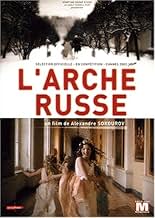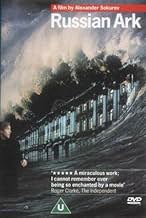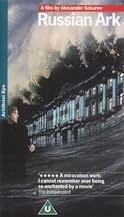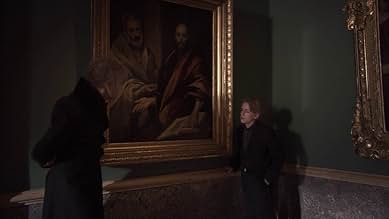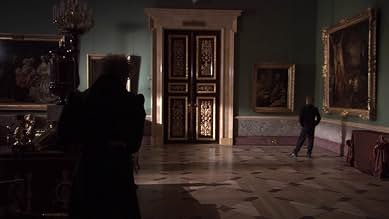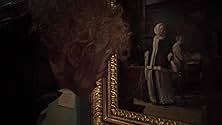Un aristocrate français du 19ème siècle, connu pour ses mémoires cinglantes sur la vie en Russie, parcourt le musée de l'Ermitage de Russie et fait la connaissance de personnalités historiqu... Tout lireUn aristocrate français du 19ème siècle, connu pour ses mémoires cinglantes sur la vie en Russie, parcourt le musée de l'Ermitage de Russie et fait la connaissance de personnalités historiques des 200 dernières années.Un aristocrate français du 19ème siècle, connu pour ses mémoires cinglantes sur la vie en Russie, parcourt le musée de l'Ermitage de Russie et fait la connaissance de personnalités historiques des 200 dernières années.
- Réalisation
- Scénario
- Casting principal
- Récompenses
- 10 victoires et 15 nominations au total
Avis à la une
The film begins in the dark with the narrator (apparently Sokurov) commenting about how little he sees. "My eyes are open", he says, "and yet I see nothing". He does not know where he is but apparently has just died in an accident of some kind. Is this a movie? A play?" he asks. He receives no answer except a vision of 18th century aristocrats moving slowly into the Tsar's palace. An elegant white-haired man in a black cloak (Sergey Dreiden) suddenly appears and escorts the confused narrator into the corridors of the grand palace. "Everyone knows the present, but who can remember the past", says the stranger as they walk from one ballroom to the next, witnessing great works of art as well as ghost-like presences from Russia's past. We see works by El Greco, Rubens and Van Dyck in their awesome splendor. We run into Peter the Great thrashing a general, Catherine the Great looking for the bathroom, and Nicholas II, the last Russian Tsar hosting the Great Royal Ball of 1913, the last such formal occasion of its kind.
As we enter the Great Nicholas Hall, the opulent room is filled with thousands of aristocrats dancing the mazurka in gorgeous period costumes. A full orchestra is playing in the background and young soldiers are nattily dressed in their uniforms. How beautiful it all seems and how it appears they were destined to live forever but we all know how the nasty Bolsheviki spoiled the party. Ah yes, how green was my valley then. Sokurov said he wanted to make a whole film "in one breath" and he has succeeded in simulating the breathing process, pulling us in, then moving us out as we feel the rhythm of our own life beating with the swirl of lost humanity. At the end of Russian Ark, we see the peaceful flow of a river outside the hall to which the narrator comments, "The flow is forever. Life is forever." Having completed the past, our invisible guide is now ready to move into the endless silence that is, in the phrase of the Anglican priest Thomas Kelly, "the source of all sound".
It would have been enough that the director got extensive access to the Hermitage Museum in Petersburg to show it to us.
It would have been enough to have authentic costumes, choreography, and make-up for several centuries of Russian history. (I was reminded that my husband's grandmother was a young seamstress for rich folks like these, making this extravagant lifestyle possible.)
It would have been enough to have literally a cast of thousands because how else can one really know how those fantastic ballrooms and grand staircases were meant to be used and seen without a full orchestra and gowned and uniformed participants as far as the camera can see?
It would have been enough to come up with a cute gimmick of a time-traveling two-some to glide us through the rooms of the Hermitage to show the tsars, aristocrats, curators, and ordinary Russian tourists who have passed through over the years, with humorous commentary on Russia's changing relationship with Europe over these centuries as shown through the art and architecture of the building while wars and revolutions loomed outside.
But then, it would have been enough that it's all done in a single take over just an hour and a half with luscious cinematography.
There was a slow line to get in the theater so I missed the opening historical background, and I've learned most of my Russian (let alone European) history from novels and movies so I did get a bit lost here and there wandering the corridors of history, but the unseen narrator posits that this is all a dreamscape anyway.
I made a point of seeing this because a fellow cinephile who I frequently bump into at my local arthouse had directly called the distributor asking when it would be playing elsewhere and was told they can't afford to make more prints available so one can only see it at the Manhattan theaters -- so make a point to see it on a movie screen and not just wait for when the History Channel shows a reduced version.
For their bravura, awe-inspiring cinematic tour-de-force, director Alexander Sokurov and cinematographer Tilman Buttner take us into the famed Hermitage Museum and Winter Palace in St. Petersburg, providing us with a grand tour not only of the opulent rooms and famous artwork contained therein, but of 300 years of Russian history as well, as various vignettes involving famous people (from Peter and Catherine the Great to Nicholas and Alexandra) and events are played out within the glorious gilded walls.
`Russian Ark' is a bold and audacious project that is the cinematic equivalent of a breathlessly performed high wire juggling act. We know that one false move on the part of the actors or the cameraman, one missed cue or accident of fate could bring the whole delicately poised enterprise crashing down around them. How often, one wonders, did a perfectionist like Sukorov have to resist the temptation to yell `Cut!' to his actors and crew? It's truly amazing to see just how beautifully planned and flawlessly executed the final product turns out to be, especially the ball sequence at the end which features hundreds of dancers and spectators who are set in beautifully choreographed and constantly whirling motion. What's most remarkable is how much of a participant the camera itself is in the proceedings. Not content to stand idly by and observe the scene like some passive onlooker, the camera moves right into the center of the action, gliding in and out of the crowds with utmost grace and precision. Visually, the film is stunning, with exquisite costumes and furnishings as far as the eye can see. Indeed, `Russian Ark' is, among other things, a veritable feast for the eyes, the likes of which we have rarely seen on film before.
`Russian Ark' does have something of a `plot,' involving a narrator whom we never see, a 21st Century filmmaker we assume it's Sukorov himself - who's found himself inexplicably caught in some type of time warp and magically transported to this strange spectral world. There's also a bizarre European `ghost' figure from the unspecified past who comments - and occasionally attempts to intrude on the actions taking place around him. But these two characters are of far less interest to the audience than the aural and visual delights of the film itself.
`Russian Ark' is a wonder to behold, for it is much more than just an `exercise,' a `gimmick,' or even an `antithesis' to Eisenstein; it is a vibrant work of art that challenges the limits of its medium and reminds us of just what it is about movies that we love so much.
The film was obviously shot in one day, but the cast and crew rehearsed for months to time their movements precisely with the flow of the camera while capturing the complex narrative, with elaborate costumes from different periods, and several trips out to the exterior of the museum. Tillman Buttner, the director of photography, was responsible for capturing it all in one single Steadicam shot. "Russian Ark" is an amazing accomplishment, and clearly made with passion, but while the film is sure to be hailed as a masterpiece by some, its narrative conceit isn't nearly as interesting as the technical feat of its creation. The result is a unique and intelligent film with sporadic moments of transcendent beauty that fails to create a strong emotional connection with its audience. It's essentially a 96-minute museum tour, with the added benefit of time travel and wax figures that briefly come to life.
But wax figures are all they are, essentially. Sokurov, as though following a hasty guide, spends so little time with the historical figures he portrays that it often feels as though he's moving on just as you begin to figure out who and what you're watching. The Russian experience of World War II, for example, is portrayed with a brief stop in a foreboding, ghostly room filled with coffins. The filmmaker is known for his lugubrious pacing, but Russian Ark has the odd distinction of seeming both slow paced and rushed. It moves slowly and mournfully, but still only glances across the surface of the eras it portrays. It's a demanding film, encompassing a wealth of Russian history and art history between its first and final frames. Those who stay with it will be rewarded in the end by a gorgeously mounted ball, in which the camera gracefully slides among elaborately costumed dancers as the orchestra plays. It's a deeply felt irony that this transcendent moment of joy takes place on the eve of the Russian revolution, and the world of these briefly glimpsed characters is about to come crashing to an end. It's a shame that the film has few moments where form and content align so powerfully
Le saviez-vous
- AnecdotesShot in a single take. The first three attempts were cut short by technical difficulties, but the fourth was successful.
- GaffesMany extras look to the camera and they quickly return to a default mark.
- Citations
The Time Traveller: Sir. Sir. A pity you're not here with me. You would understand everything. Look. The sea is all around. And we are destined to sail forever, to live forever.
- ConnexionsEdited into Spisok korabley (2008)
- Bandes originalesMazurka
(from opera "A Life For The Tsar")
Music by Mikhail Glinka
Performed by Mariinsky Theatre Orchestra
Conducted by Valery Gergiev
Meilleurs choix
- How long is Russian Ark?Alimenté par Alexa
Détails
- Date de sortie
- Pays d’origine
- Langues
- Aussi connu sous le nom de
- Russian Ark
- Lieux de tournage
- Sociétés de production
- Voir plus de crédits d'entreprise sur IMDbPro
Box-office
- Montant brut aux États-Unis et au Canada
- 3 048 997 $US
- Week-end de sortie aux États-Unis et au Canada
- 29 022 $US
- 15 déc. 2002
- Montant brut mondial
- 8 691 860 $US
- Durée1 heure 39 minutes
- Couleur
- Mixage
- Rapport de forme
- 1.78 : 1
Contribuer à cette page








